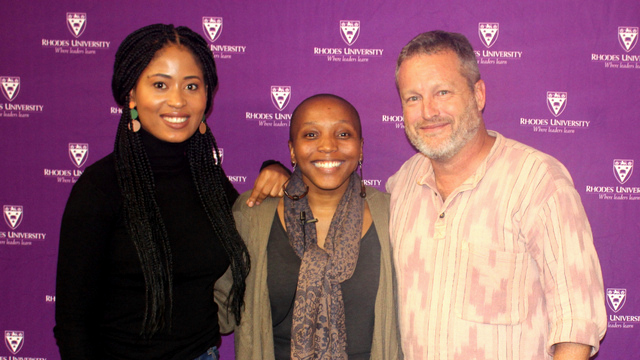
By Hazel Simpo, Honours in Psychology student
Human Rights week took place from 18 to 22 March 2019 at Rhodes University. The Equity and Institutional Culture Office hosted several events that focused on human rights such as the right to vote, the right to water and how these rights are not equally and equitably accessible to all members of South African Society.
A panel discussion on the right to vote in South Africa was held on 26 March 2019 in the Eden Grove Blue Lecture Theatre. This discussion focused on the right to free, fair and regular elections and the upcoming South African general elections taking place on 8 May 2019. On the panel was Dr John Reynolds, Senior Researcher and Head of Neil Agget Labour Studies Unit (NALSU) and Simamkele Dlakavu, PhD candidate and visiting lecturer in the Politics and International Studies Department at Rhodes University.
Dr Reynolds was the first to present on the issues around voting in South Africa. His presentation and discussion focused on four major aspects which are: right to vote; voting since 1994; lives of South Africans since 1994; and to vote or not to vote. On the first aspect, he said that the right to vote for South Africans was won through a long and complex history of struggle against colonialism and apartheid. He highlighted that it is a right to choose a government that will develop and implement policies but “is the government meeting the people’s needs?”
The South African Constitution sets the rules of how the three spheres of government works, which are the national, provincial and local government. Citizens of South Africa have the right to choose their government through elections. Section 19 (3) of the Bill of Rights states that “every adult citizen has the right to vote in elections for any legislative body established in terms of the Constitution and do so in secret”.
Moreover, Dr Reynolds traced the voting trend since 1994 and he highlighted that voting turnout has dropped since 1994. There are so many reasons that are attached to the deteriorating voting turnout in South Africa for example, people losing their faith in the government as they are failing to meet people’s needs. He further noted that there are 303 political parties registered with the Electoral Commission of South Africa (often referred to as the Independent Electoral Commission/IEC) but not all of them are actively participating. He opened a platform for attendees to reflect on the trend of decreasing voter turnout in the words “what does it mean to us South Africans?”
Finally, Dr Reynolds presented on the lives of South Africans since 1994 and the question of whether to vote or not. South Africa is one of the, or probably most unequal society in the world associated with low income, unemployment and poverty. Gender and race are still markers of poor employment and income outcomes. Then the questions which followed were: “What can we do to signal to the national and provincial spheres of government that we are not happy with? Should we vote tactically, spoil the votes, not vote?” This led to a very informative and educative discussion with regards to voting.
Dlakavu covered a number of issues related to voting in South Africa. She reflected that 27 April 1994 was the day the nation cast its vote in the first democratic election. South Africans were delighted about casting their votes, but not everyone was happy for South Africans, as there were serious incidents of political violence like the bomb blast at the then Johannesburg’s Jan Smuts Airport on the election day to prevent the majority rule.
South Africans expected to receive social justice and basic needs as the African National Congress (ANC) messaging was about attaining social-economic freedom. She quoted some of the most prominent people who contributed to the history of South Africa, such as Steve Biko’s, “In a bid for change, we have to take off our coats, be prepared to lose our comfort and security, our jobs and positions of prestige, and our families. A struggle without casualties is no struggle” and Desmond Tutu’s, “In the land of my birth I cannot vote, whereas a young person of eighteen can vote. And why? Because he or she possesses that wonderful biological attribute - a white skin.”
However, it seems as if people’s right to vote is being abused by those that they put in power as they are failing to meet the basic needs of South Africans. Dlakavu encouraged young people to be more active, and to voice their ideas in order to build a better South Africa. She concluded that “voting is not an option for the youths” as it is very important to value the right to vote as it is one of the means to social, political and economic justice and we need to engage the state for us to acquire services.
